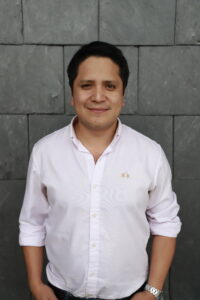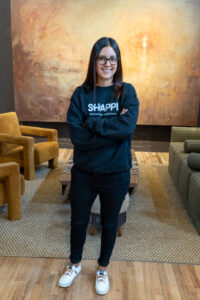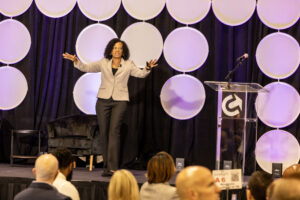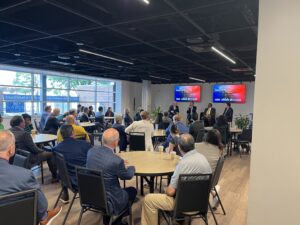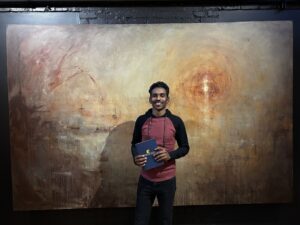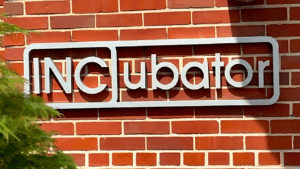Amanda Ellis
Gary Poole, Managing Editor of The Pulse, a weekly publication covering news, music, art, culture and politics, has spent his career in radio and print journalism. He has headed The Pulse for years and he’s also a host on Big 95.3. He’s quite the well-rounded guy – a Hawaiian shirt enthusiast who dabbles in art and music, and his other projects include science fiction anthologies and emceeing robot battle competitions.

Trend: Tell me about the Pulse.
Poole: We have broader readership that I think a lot of people realize. Yes, there are a lot of younger people, college age and Gen Z, millennials, but there are just as many Gen Xers and boomers. Before you have kids and after your kids are grown or responsible enough to take care of themselves, you go out. So our readers are on both sides of that – they go to JJ’s and they go to the Hunter. We have an active readership. For an arts and entertainment paper, we’ve also done a lot of hard journalism over the years.
In terms of the kind of businesses that we're looking for … it’s the ones that are helping a cause. We've profiled The Chattery, wonderful people all about education, continuing education and fun. Classes on calligraphy, getting organized, everything you can think of. We wrote recently about Hospice of Chattanooga, an organization made up entirely of angels on earth as far as I'm concerned. I'm a former client with my father and they were absolutely wonderful and made an awful, incredibly emotional time more bearable.
Trend: How did you end up leading the Pulse?
Poole: It’s funny, I was actually written about in the first issue, a little column about radio. Then I started writing a tech column, features, I’d do the police blotter. Then (late Chattanooga media executive) Jim Brewer asked me to come on board as an editor. I also worked on layout because I was the only one on the team with that skill. Now we’re on Vol. 16 and still going strong.
I’m still the art director; I still do all the layout. That's almost unheard of in the industry. I assign stories. I do a lot of the editing. I still write short pieces. I have a lot of free rein, but I've earned that by doing this long enough that I’m trusted to publish a great product.
Trend: What brought you to Chattanooga?
Poole: I was raised in Atlanta and had been visiting Chattanooga since the 70s. I remember coming to Rock City when I was 8. I did a tour in the military. When I got out, I was like ‘What am I going to do with my life?’ Office life wasn't for me. I knew I liked to write. I knew I liked to talk to people. I was curious about what people do, what makes them tick. I ended up at a local radio station in the Florida Keys for a few years, and I also wrote for the weekly paper.
I worked my way up to Tallahassee where I was doing the morning show at a rock station, and then ended up back in Atlanta, which was great – a major market and my hometown. The stress of a major market radio station, however, was insane. Program directors with stopwatches going ‘That break was supposed to be seven seconds.’ And the pressure in sales was worse. It was not a happy environment, not conducive to creativity.
When my contract was up, I needed a break, so I helped a friend run a nightclub near Georgia Tech. Another friend had taken over a Chattanooga radio station and he called me. I made the jump here and never regretted it. I have zero intention of ever leaving. I’ve been in Chattanooga since ‘96 and I've worked for at least a third of the stations in this town.
I can never decide whether radio or print means more to me because I love them both equally. It’s great I don't have to choose. I love being around creative people and I picked the right profession for that.
Trend: How have you seen Chattanooga change?
Poole: Many of our businesses, especially newer businesses, have decided to be participatory in the community and in the world. Not just selling coffee or making widgets.
Chattanooga historically has very dominant foundations doing fantastic work. Now we have small groups of entrepreneurs and business owners doing their own part and it’s a richer tapestry. Take Mad Priest Coffee – it’s nice to have a good cup of coffee and feel good that part of the money you're spending helps someone else. (For Mad Priest, that’s refugees from around the world.)
Chattanooga is an incubator for ideas and businesses. From Bellhops to Mrs. B’s Reggae Café on Broad Street making the best Jamaican food.
I've seen a lot of changes. When The Pulse started, our first issue was called The Coming Battle for East Main Street. That was 15 years ago, and the Southside has transformed.
But it's not the only part of town that's been transformed. There’s the Aquarium and the Walnut Street Bridge. Those were the two things that changed downtown, but it's spread from there. Coolidge Park transformed the Northshore; now we have West Village, the MLK district.
River City Company estimates that between 2010 and 2020, the population downtown will double. And when you add in Southside and Northshore, it's a population boom. And who's moving downtown? Millennials and boomers. Boomers don't want to mow lawns. Same with younger people. They want to live near where they work and play. It's interesting how many people are returning to the city.
Trend: What are the things you think we still need to work on?
Poole: Food deserts are a problem. In the downtown area, there’s only the NorthShore Publix, Whole Foods or the St. Elmo Food City. There are a few small bodegas, but people living downtown need to be able to easily get groceries.
Transportation is an issue as well. We’re attached to our cars here. We just covered this in a recent issue and talked with CARTA. They’ve been forward-thinking in many ways, applying for grants for studies and such. The downtown shuttle has been a tremendous success. And not just for tourists. Outdoor Chattanooga and Bike Chattanooga have done a good job partnering with the City to make us more bike friendly. I have found it easier to drive my car on MLK since the new bike lines.
Trend: Is there anything you don't like about your job?
Poole: Getting up at 4 a.m. Naps become important. I used to be a classic night owl, but I've been doing morning radio for so long now that I wake up at 5 a.m. on weekends. And then the cats are like, ‘You're up. Great. Feed us.’
Trend: What are some impactful stories you’ve worked on?
Poole: I don't write as many features for the paper now, mainly because I've gathered an incredible group of writers.
But I've written a story twice now about the war on drugs and the toll on the community. Those are difficult stories. Lots of research to cover, including how society's viewpoints have changed. I’m wondering if the next time I write it, it will be about country-wide legalization of marijuana and how it’s changing our society.
We did a story on being Muslim in Chattanooga and we found a young Muslim family that didn’t mind being photographed and interviewed in Coolidge Park. We did this wonderful photo shoot and the mother wore colorful traditional Muslim garb. She was out with her family on a beautiful day. To my great delight as a citizen, several people complimented her on the pattern and the color.
And there was no blowback. When we published the article, her face on the cover of the paper, we were nervous about that. But people accepted and respected. And that was an article I look back on with great pride.
Trend: What is the future of journalism?
Poole: The demise of radio has been predicted since television. It’s never going away, but the way that people consume radio changes. DJs playing records and talking about silly stuff in the morning will be around a long time because people still want entertainment. And the thing about podcasting is it requires a couple extra steps. You have to get your phone and pick something out.
Radio’s in your car, your home, people are used to consuming it. And while there’s satellite radio, Pandora, etc., you're not going to get local traffic, weather and people. When I started in radio, I was actually a DJ, as in vinyl 45 on a turntable, with commercials on individual cartridges. They called them carts. Now everything's in the computer system and I touch buttons, but the person behind the microphone does the same thing.
Print is a different story. Classified advertising has been taken over by the internet. Car dealerships, department stores, things that have kept daily papers in business, are going away.
They're finding new sources of revenue. There’s always a need for content, but unfortunately a bunch of people think that content should be free. Our competition is the internet. I can pick up my phone right now and go to Google News and find out everything that's going on in the world. What you can’t find? Who’s playing at JJ’s Bohemia tonight and why I should go see them. Local people, local writers, writing about local things. That’s us.
Trend: How should people pitch story ideas to The Pulse?
Poole: 80 percent of our stories are pitched by our writers. So step one, if you know somebody who writes for The Pulse, there's a good place to start, or email me ([email protected]). Keep it short and sweet. If it's interesting, I’ll follow up. If you don’t hear back, check in by email, but not phone. If you have an event, or your buddy's band is playing somewhere, let us know. Let us know your charity or community event. We want to know everything that's going on in Chattanooga.
Trend: What’s frustrating about some pitches you receive?
Poole: Many people don't understand the publications they pitch. If you're promoting someone who got promoted at a law firm, we're not the publication for you. If you're repping a company that has made a commitment to raise money for famine relief in Sudan, you have my attention. Target your approach. And read us. Everything's online. You have to consume the media you’re pitching.
It helps to build relationships. You want me to know that when I get an email from you, it's going to be interesting.
Also, understand that as a weekly, our editorial planning works more like a magazine than a daily. It might be months before we have space for your story.
Trend: What do you do for fun?
Poole: I started Robot Battles in 1991 (contestants build robots that fight tournament style). I can’t build them and I’m awful at driving them; I'm the emcee, the entertainer. I'm the one that keeps the crowd entertained in between the robot matches. On the rare occasions I actually have to drive one, some people think that I'm driving badly on purpose because it would be bad form for the head guy to win. But I’m actually bad.
I’ve been involved in the science fiction world for 30 years, and I edit science fiction anthologies. “Black Tide Rising” is about a zombie apocalypse, but it isn't about the zombies, it's about people rebuilding civilization. It debuted at No. 1 on Amazon for science fiction anthology.
So I got asked to do another one. And that's “Voices of the Fall.” It also debuted at No. 1 on the science fiction anthology chart.
I've been a musician since I was 8. This was never a career goal for me, but I've been in plenty of bands. I've released albums. I've gone on small tours. I like performing and connecting with an audience. I like expressing what's on my mind through music.
I think about early history, and there was always one person in the tribe who told good stories. The shaman. I'm a storyteller. Sometimes I do it in a microphone. Sometimes I do it with a keyboard. Sometimes I do it with a musical instrument.
Trend: Do you sleep?
Poole: Honestly, not much. I sleep between four and six hours a night.
